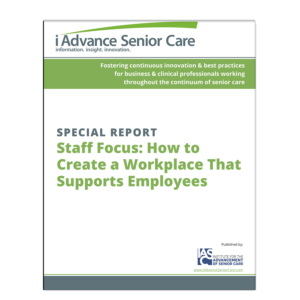Guilt-Free Getaways for MDS Coordinators
| BY JENNIFER GROSS, RN, BSN, AND STEVEN B. LITTLEHALE, MS, APRN, BC Guilt-free getaways for MDS coordinators Just because the MDS never takes a vacation doesn’t mean you can’t |
| It’s summertime! The days are longer, the weather is sunny and warm, and most people are planning their summer vacations. But for many MDS coordinators, vacation time is often a time of anxiety and guilt. “How can I take a vacation?” they ask. “No one else will do my job while I’m gone.” Well, take heart, weary MDS coordinators; we can help you make your time off guilt-free. Our four easy steps will ensure that your vacation will not put your facility at risk for late or lessened reimbursement or survey deficiencies-specifically: |
|
| Work Those Dates Before you buy that perfect poolside ensemble, a quick review of the scheduling requirements mandated by CMS is necessary. The required MDS assessment schedule (including completion and transmission requirements) is summarized in the RAI Manual, Version 2.0 (August 2003, p. 2). The following list spells out the maximum number of days allowed between assessments:
The “MDS clock” is reset whenever a new completed assessment is submitted; thus, the next assessment is due based on the R2b date of the most recent assessment. In addition to the requirements for OBRA assessments described above, Medicare MDSs have a higher frequency of required assessments, each with its own ARD window. Each of these assessments must be completed (R2b) within 14 days of the ARD. If an assessment is dually coded as Medicare and OBRA, then both sets of rules must be followed; to be compliant with both, always choose the most stringent. For all assessment types, data entry and transmission to the state must be completed within 31 days of the completion date of the MDS. As you can see, you have to deal with a strict timeline, which can lead to F-tags on surveys as well as financial penalties if the submission process falls behind. Unfortunately, the realities of working in a nursing home sometimes interfere with the timely completion of MDS assessments. Staffing issues often result in MDS coordinators being pulled from their jobs to work on the floor. Sick days are often unavoidable. And, yes, MDS coordinators get vacation time, too! But how can you take the time off you’re entitled to while maintaining compliance with your MDS schedule? Back Yourself Up Be an Early Bird First, though, a word of caution: MDS schedules should not be “played with” on a regular basis merely as a matter of convenience. Our advice is meant for nonroutine situations, such as planned time off for vacations or medical leaves. For example, if you have a Medicare resident who will be due for a 30-day MDS while you are in the middle of your Caribbean cruise, you and your team will need to plan ahead to make sure that the MDS is in compliance and accurately reflects the resident’s acuity. Medicare assessments. You may find this to be the area offering the least flexibility. Given the higher frequency of required assessments, as well as the pressure from your billing office to provide them with RUG scores, it may be more difficult to adjust the schedule. However, if your facility uses a team approach to managing your PPS system, you could plan ahead with your coworkers to project which residents will be in their assessment window while you are away. In many cases it is necessary to wait until the end of the assessment window to choose the optimal ARD for your residents. If the PPS team is knowledgeable about the RUG-III system and ARD selection, this process will go much more smoothly. Remember, the ARD should be chosen so that the greatest acuity is assessed. This is not “gaming the system,” but one way to ensure that you are reimbursed for the excellent care provided. Remember, however, that the routine, nonjudicious use of the grace days available at the end of each assessment window may come under review by surveyors or fiscal intermediaries, so use these days sparingly. Once an ARD is selected, the MDS must be completed within 14 days. Any member of your team should be able to complete the MDS, so cross-training can come in handy when the MDS coordinator is away. As long as the MDS is completed in a timely fashion, you have up to 31 days from the completion date to transmit the assessment. OBRA assessments. Traditional long-term care assessments (OBRA) offer more flexibility in scheduling your assessments. As we stated above, there are explicit rules for the maximum number of days between MDS assessments, and late assessments may put your facility at risk for survey deficiencies (for a look at how close some MDS coordinators come, see figure). However, what is not spelled out in the RAI Manual is that there is no minimum time limit between assessments. (You see this in action all the time!) A significant-change assessment satisfies the requirements of a quarterly assessment and a comprehensive assessment. The next quarterly would be due 92 days from the R2b date, which means you can schedule assessments to be done early to clear the schedule for your vacation week (or to spread out assessments if you have too many of them due at the same time). You may want to schedule your annual MDSs earlier, especially if you have many of them to do, to give you more time to complete the RAP and care plan process. Once you have scheduled the assessments, the regulatory standards for completion and transmission can be complied with while allowing for time off. Leave a Wake Behind You
Bon Voyage Have a well-deserved good time. |
|
| Jennifer Gross, RN, BSN, is a long-term care consultant, and Steven B. Littlehale, MS, APRN, BC, is Chief Clinical Officer of the Healthcare Services division at LTCQ, Inc., Lexington, Mass. For further information, phone (781) 457-5907, e-mail shea@ltcq.com, or visit www.ltcq.com. To comment on this article, please send e-mail to gross0604@nursinghomesmagazine.com. For reprints in quantities of 100 or more, call (866) 377-6454. |
I Advance Senior Care is the industry-leading source for practical, in-depth, business-building, and resident care information for owners, executives, administrators, and directors of nursing at assisted living communities, skilled nursing facilities, post-acute facilities, and continuing care retirement communities. The I Advance Senior Care editorial team and industry experts provide market analysis, strategic direction, policy commentary, clinical best-practices, business management, and technology breakthroughs.
I Advance Senior Care is part of the Institute for the Advancement of Senior Care and published by Plain-English Health Care.
Related Articles
Topics: Articles , MDS/RAI , Staffing











